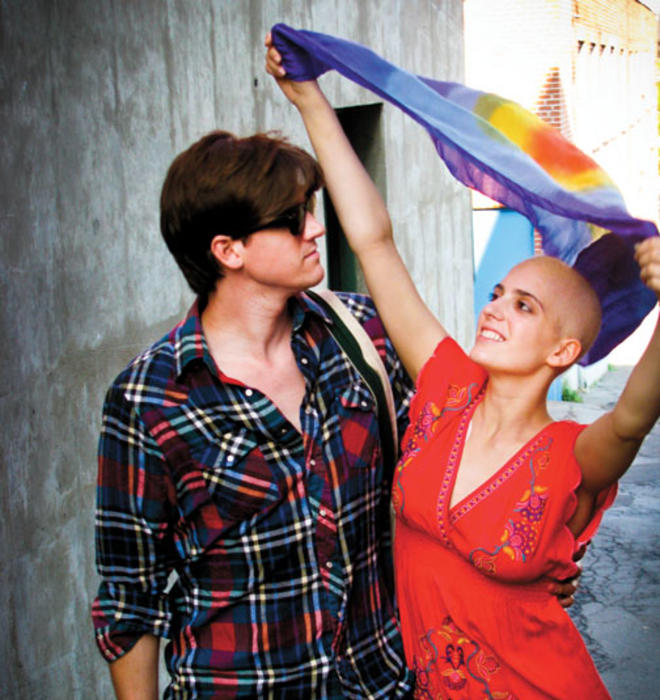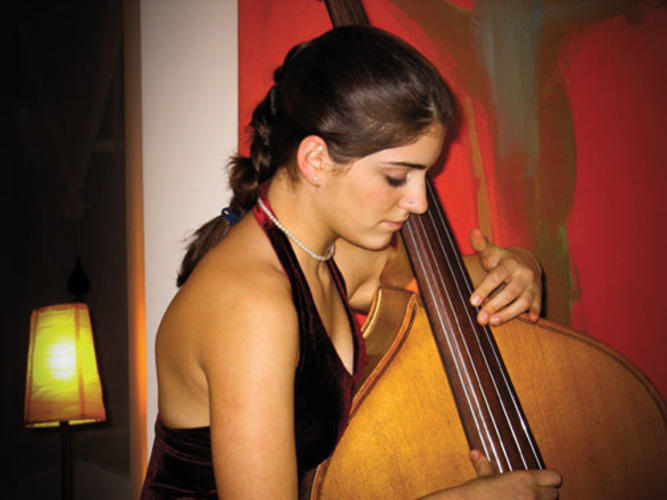
“I can’t put my life on pause”
Writer Suleika Jaouad ’10 stares down her cancer from the pages of The New York Times
SULEIKA JAOUAD REMEMBERS THE DAY, in the first week of November 2010, when she first felt that something inside her had gone wrong. The freshly graduated Princeton student, fluent in French, was just starting out as a paralegal at a law firm in Paris. She had an apartment in the city’s quiet Le Marais district and a new boyfriend coming to visit from New York. But on that Saturday, Nov. 6, when the 22-year-old should have taken to her journal to dream up a list of the romantic cafés and art galleries she would share with her beau, a high fever, exhaustion, and a painful sore on her mouth instead had her penning an ominous worry onto her diary’s neatly lined pages: “Something is terribly wrong. I can’t put my finger on it, but it feels like there is a deadly parasite growing in my body.”
Two years later, Jaouad ’10 is sipping ice water in a friend’s Brooklyn apartment when she recites that entry from memory with, still, a disbelieving shake of her head. The cascade of auburn waves that spilled over her shoulders that November Saturday so many months ago is long gone, and her smooth, bare skull bears witness to all that unspooled in her young life since then, starting with the abrupt move back to her parents’ house in Saratoga Springs, N.Y., to recover from what French doctors first thought was exhaustion from the 100-hour workweeks typical of young professionals paying their dues. Then, after a hematologist suggested a biopsy just to be sure there was nothing more, came the diagnosis of acute myeloid leukemia and myelodysplastic syndrome (the one-two punch of rare disease that recently killed the writer and filmmaker Nora Ephron); seven weeks of inpatient chemotherapy that didn’t work; more intense chemotherapy; a bone-marrow transplant (her younger brother, miraculously, was a perfect match); and, finally, now, a full year of additional chemotherapy to give her high-risk transplant the best possible chance of success. “So that’s where I’m at,” Jaouad says matter-of-factly on July 30, just five days after starting her post-transplant chemo. “I’m feeling better. A lot better.”
This will not be news to readers of Jaouad’s weekly column for The New York Times, “Life, Interrupted,” where she shares raw, real-time updates on her health along with her thoughtfully rendered reflections on the hassles and heartbreaks and — oftentimes — the awkwardness of being a young adult with a deadly cancer. In 800-word dispatches sometimes accompanied online by video, she has explored her feelings of guilt (for getting so much attention when she’s sick, for envying the healthy), her ambivalence over updating her Facebook status to: cancer (“friends were still posting on my wall asking if they could visit me in Paris”), and how she felt like a “misfit” among her peers for moving back into her childhood bedroom, with its hot-pink vanity and old dolls. Then there was her rush to have her eggs retrieved and frozen before the chemo left her infertile:
The family minivan idles at the intersection of 59th and York in midtown Manhattan. My boyfriend swabs my midriff with alcohol as he steadies the needle. My parents look on from the front seat. ... The needle is filled with gonadotropin, a hormone that stimulates the ovaries to produce eggs. I’m late for my checkup at the fertility clinic. How in the world did I get here?
Though Jaouad has filled some 20 to 30 journals since she was 11, she was reluctant, at first, to go public with this latest, most painful chapter. So many friends and relatives didn’t know she was sick, and for those who did, it was draining to have to respond to every concerned call and email seeking hopeful updates. “It was emotionally overwhelming to Suleika — and to us. Every time you announce the news to someone else, you have to relive the devastating feelings all over again by seeing their reaction to the news,” says Jaouad’s mother, Anne Francey, a Swiss-born painter. (Her father, born in Tunis, teaches French and foreign literature at Skidmore College.)
In January, Jaouad launched a blog, Secrets of Cancerhood (secretsofcancerhood.com), to keep her friends informed more efficiently, less torturously, and also to give her something to do while she was in the throes of endless treatment. “After many months watching bad television and feeling really upset about my life, I started writing again little by little,” she says. “And in January, for the first time, I started the blog and all these emotions and experiences came pouring out.” When she shared the blog on Facebook, it caught the notice of her former journalism professor at Princeton, Times veteran Martin Gottlieb. He passed it along to a former colleague, Tara Parker-Pope, who writes the Well blog for the Times, and Parker-Pope brought Jaouad aboard as a paid contributor in March.
Her first byline on actual newsprint appeared April 3, just one day after she entered the transplant unit at Memorial Sloan-Kettering Cancer Center. “She held the newspaper and said, ‘Oh, The New York Times is going to save my life,’” says Francey. “Here she was, facing this medically scary procedure, and yet she had something else happening to her that a lot of young people dream of.” While her readers, many touched by cancer themselves, frequently comment on how inspiring Jaouad’s columns are, she says it’s mutual: “I feel grateful for and inspired by my readers’ stories and support.”
And already she’s dreaming up new projects. On Aug. 1, she and the boyfriend who followed her home from Paris and hasn’t left her side since, Seamus McKiernan, associate blog editor for The Huffington Post, moved into an East Village apartment that’s been in her family for years. “It’s the biggest milestone so far because it means I’m well enough to care for myself again,” Jaouad, excited to start decorating, says of the move. With a relatively poor prognosis, she won’t go so far as to say she’s planning for a cancer-free future. Instead, she says, “I think what I’ve learned is that I can’t put my life on pause, because getting better can take any amount of time.”
And so Jaouad has signed with a literary agent and is working on a book proposal about her relationship with McKiernan and “how I found love in a time of cancer.” A former Juilliard student of the bass who always regretted not learning to play jazz, Jaouad also has lined up lessons, and having relied on hats and scarves and hair tattoos to maintain her sense of style and self throughout treatment, she has ideas for a hat-making business. But mostly, she is a writer now. She brims with story ideas, eager to network with journalists and pitch editors. “I’m so excited to have some energy that maybe I’m overshooting a little bit,” Jaouad says. “But I’m grateful to be here, to put it simply.”
Postscript: At press time, two months after Jaouad spoke with PAW, she provided an update: Her recent chemotherapy, with its cumulative effect, has been much rougher than she anticipated. “Chemo is chemo,” she said. “And there’s no sugarcoating it. But day by day, I’m working on getting stronger.” Despite the chemotherapy, she has been active — taking a photography class, speaking on behalf of the Leukemia & Lymphoma Society and a group called Stupid Cancer, and taping an interview for NBC’s Today show.
Sandra Sobieraj Westfall ’89 is the Washington bureau chief for People magazine.







No responses yet